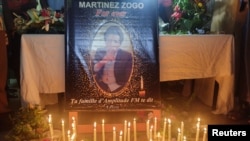Cameroonian journalists are calling for an independent investigation after popular radio reporter Martinez Zogo was found dead in the capital, Yaounde. Zogo was abducted last week after saying he could be killed for doing an investigation into corruption cases among government officials.
This music titled “Journalists in Danger” by Burkina Faso artist Alpha Blondy is played repeatedly on several radio stations in Yaounde and Douala, the central African state’s economic hub. Blondy released the album after the December 13, 1998, assassination of Nobert Zongo, a Burkinabe investigative reporter.
Today, the song’s message resonates in Cameroon as radio stations broadcast the music in memory of Martinez Zogo, a popular radio host. Zogo's mutilated body was found Sunday in Soa, a neighborhood near the capital, five days after he was abducted by unidentified assailants.
Almost all media organizations in Cameroon on Monday condemned the killing of Zogo, who they describe as a whistle blower and courageous reporter fighting graft and the mismanagement of state funds.
Patrick Mua, a reporter with the Guardian Post newspaper says he is sure Zogo was killed by people he had accused of stealing state funds.
"It is rather unfortunate that journalists have become targets especially by politicians and people who think that journalists should not exercise their duties as they are supposed to do. They expect that journalists should operate according to their whims," he said.
Zogo was director of Amplitude FM, a private radio station in the capital, and ran a daily French language program that examined social issues and held discussions on topics such as good governance.
Zogo said he had documents to prove that some senior state functionaries have stolen several million dollars from state coffers since 2013. Zogo said he had forwarded proof of what he called "a high wave of embezzlement and corruption” involving a local media organization to Cameroon’s President Paul Biya. He said he was receiving death threats daily.
In an audio excerpt from his program two weeks ago, Zogo says he has information that some people involved in corruption want to kill him. He says he is ready to die, but that his killers will not live forever. Zogo says corruption is rife and Cameroon’s President Biya is not doing much to punish officials who take money that belongs to the people.
VOA could not independently verify if Zogo sent documents on alleged corruption to President Biya through officials of Cameroon’s ministry of justice as he said during his radio program.
Cameroonian journalist and activist Jean-Bruno Tagne says the killing of Zogo indicates that the press is under threat in Cameroon.
He says Zogo's killing has confirmed to the world that Cameroon is a brutal state managed by people who operate as mafia groups. He says Zogo was wrong to think that the government would protect him, support his fight for corrupt officials to face justice, and restore funds stolen from Cameroon’s public treasury. Tagne says rights groups and journalism associations call for an independent investigation to find Zogo’s killers.
Cameroon’s Journalists Trade Union called on reporters to be careful but encouraged them to continue coverage of corruption and shed light on undemocratic practices they say are becoming rampant.
In a press release Monday, Cameroon government spokesperson Rene Emmanuel Sadi said early investigations indicate Zogo was tortured by his killers. Sadi said an autopsy and investigation are ongoing to trace the perpetrators. Sadi describes the killing as “barbaric, unacceptable and despicable.”
Cameroonian journalists say that media freedoms are threatened under country’s authoritarian rule.
Ahmed Abba, a reporter for Radio France Internationale, or RFI, was arrested in July 2015 and imprisoned for two years on terrorism allegations. In 2019, another outspoken journalist Paul Chouta, was beaten and stabbed by unknown attackers. The same year, the military arrested journalist Samuel Wazizi for allegedly supporting separatists in Cameroon’s western regions. Government troops later found his corpse in 2020 and said Wazizi died in detention.
In 2010, Bibi Ngota, publisher of Cameroon Express died in the Yaounde-Kondengui maximum security prison after he was arrested with 3 other reporters accused of forgery.




